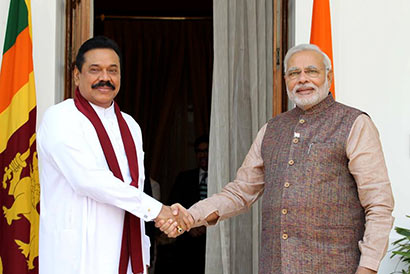Modi may take up fishermen issue with Rajapaksa

With India stepping up efforts to prove the innocence of the five Indian fishermen sentenced to death for drug trafficking by the Colombo High Court, sources told The Hindu that New Delhi was hopeful of finding a resolution to the situation that has led to protests in Tamil Nadu.
While Sri Lanka retains the death penalty, no execution has been carried out in the country since June 1976, as successive Presidents have declined signing the final orders. Sources told The Hindu that Indian officials had already contacted President Rajapkasa’s office to express India’s appeal in the matter of the five Indian fishermen. Officials also confirmed that Prime Minister Narendra Modi will “certainly take up the issue with President Rajapkasa when they meet next,” which is likely to be on the sidelines of the SAARC summit in Kathmandu between November 25 and 27.
The Sri Lankan government, which is heading for elections in January, however, remained non-committal on Friday with regard to India’s statements. “India is clearly aware of another country’s legal systems, treaties signed and convicts exchange agreements,” Information Minister Keheliya Rambukwella said in Colombo.
To begin with, India and Sri Lanka have signed an agreement on the transfer of sentenced prisoners in 2010, when President Mahinda Rajapaksa visited New Delhi, that allows the prisoners to serve out their punishment in India. If an appeals court were to commute the sentences of the convicted fishermen, there would be some hope of the agreement being applied.
In 2013, Sri Lanka transferred 29 prisoners, who had been sentenced for various offences, to Indian prisons in Tamil Nadu and Kerala under the agreement. Under the same agreement, India also transferred to Colombo a Sri Lankan national held more than a decade ago for drug trafficking and whose sentence was commuted to life imprisonment. He was repatriated in 2013.
(The Hindu)
Latest Headlines in Sri Lanka
- Sri Lanka to launch national review on social media’s impact on children January 30, 2026
- Sri Lanka, Saudi Arabia move to boost industrial cooperation January 30, 2026
- Johnston Fernando, two sons and others further remanded until February 13, 2026 January 30, 2026
- Sri Lanka raises daily wage of plantation workers to Rs. 1,750 January 30, 2026
- Sri Lanka expands Internal Affairs Units to 250 more state institutions January 30, 2026



Some Indian fishermen have engaged in the lucrative business of drug trafficking of heroin and ganja. These are serious issues that affect the lives of our people who are drug addicts. Modi must not seek to hsve those Indian fishermen who are found guilty to be released or even have them spend their sentences in Indian jails to be released in a year or two to get back to drug trafficking. Only a few are caught of the large number of Indian fishermen who engage in this on the pretext of fishing. President MR must be resolute in not giving in to Modi. He cannot threaten our national security. That is why I always advocate for an urgent pact with China to safe guard our security against India with a
Chinese – SL joint naval base in Trinco.